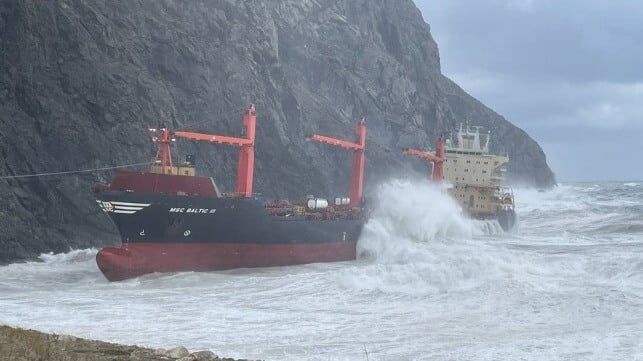Fishermen, Residents Concerned About Weather Damage to MSC Baltic III

Residents and fishermen in Newfoundland are growing concerned about the deteriorating state of the boxship MSC Baltic III, which ran aground on a rocky shelf in Lark Harbour on February 15. The North Atlantic's winter weather has arrived in earnest, and heavy wave action is smashing the ship upon the rocks, causing more damage by the day. The concern, local stakeholders say, is that the ship will break up and release debris and pollutants into coastal waters.
"This wreck is now a ticking environmental time bomb, and the lack of urgency to address it has put our fisheries, our coastlines, and our communities at serious risk," a spokeswoman for the Fish, Food and Allied Workers union told CBC in a statement.
A major storm system hit the western coast of Newfoundland last week, with sustained heavy effects on the wreck site. Salvage work on the ship was paused due to severe conditions, which were causing "significant movement in the bow and stern" and "noticeable change in the condition of the port side." Images from the scene show that the vessel's hull has buckled upwards amidships, with a clear crease visible below the painted "S" in "MSC" on the port side.
https://www.saltwire.com/newfoundland-labrador/taking-a-beating-msc-baltic-iii-further-damaged-in-worst-conditions-since-its-grounding
On Wednesday, after the storm had passed, a Canadian Coast Guard crew boarded the wreck to assess its condition. The agency said that structural damage was visible below deck, affecting framing and bulkheads in way of a water ballast tank. The contracted salvor, T&T Salvage, is conducting a thorough survey of the vessel, including an assessment of the salvage equipment that had been stowed on board - some of which was damaged or washed away.
Some local residents have questioned if the salvage project would have progressed further by this point if an access road had been built more quickly to enable movement of equipment and personnel to the wreck site. Work on the road began in early May, more than three months after the grounding. At this point, a full-scale wreck removal is unlikely to be attempted before the arrival of fair weather in the springtime, CCG response officer Bruce English told the CBC.
Most of the fuel oil has been pumped off the vessel already, and as of late October, salvage crews were flushing out the last dregs from the bunker tanks whenever conditions were good enough to allow work to proceed.
